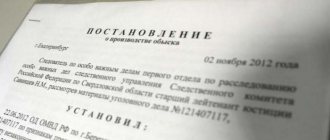Any court decision with which the accused does not agree can be appealed in a supervisory procedure. Decisions in criminal cases are no exception. Based on the results of consideration of the complaint, the supervisory court may cancel the sentence, change it or uphold it. The procedure for filing an application is regulated by Chapter 48.1 of the Criminal Procedure Code. At the end of the article you can download a sample document.
Supervisory complaint in a criminal case
The supervisory appeal must be filed directly with the Supreme Court of the Russian Federation (by mail, in person or, from 01/01/2017, in electronic form).
By way of supervision, the Presidium of the Supreme Court of the Russian Federation may review court decisions that have received legal force, listed in paragraph 3 of Art. 412.1 of the Criminal Procedure Code of the Russian Federation of December 18, 2001 No. 174-FZ (hereinafter referred to as the Code of Criminal Procedure of the Russian Federation).
The main purpose of reviewing a contested sentence, order or decision by a supervisory court is to determine the extent of their compliance with the requirements of the law.
Requirements stated by filing a supervisory complaint may be satisfied (in whole or in part), and a decree, ruling or sentence that has gained legal force can be canceled or changed if:
- discovery by the supervisory court of significant deviations from the provisions of criminal and/or criminal procedural legislation that had an impact on the overall outcome of the consideration of the case materials
- identifying data that indicates that the person did not comply with the conditions or did not fulfill the obligations stipulated by the pre-trial cooperation agreement (clause 1 of Article 412.9 of the Code of Criminal Procedure of the Russian Federation).
An example of a significant violation of procedural law is the court justifying its decision with evidence declared inadmissible (clause 5 of the review of judicial practice of the Supreme Court of the Russian Federation No. 2, approved by the Presidium of the Supreme Court of the Russian Federation on June 26, 2015).
Procedure for considering a complaint in court
The Presidium of the RF Supreme Court accepts the case for consideration based on the ruling of the judge who has previously studied the submitted materials, and sends notifications to interested parties about the place and time of the hearing.
The proceedings are carried out with the obligatory participation of the prosecutor.
The judge-reporter states:
- circumstances of the criminal case;
- the content of judicial acts adopted by previous authorities;
- the arguments that served as the basis for filing the complaint.
The parties to the case (interested persons) have the right to give explanations, and the person who filed the supervisory complaint speaks first.
The result of the consideration of the case is determined by the Presidium by voting. The proposal most favorable to the convicted person is put to a vote first.
If there is an equal number of votes cast for the revision of the criminal case and against its revision, the supervisory complaint is considered rejected.
The grounds for canceling or changing a sentence (decision, ruling) are:
- significant violations of the Criminal Procedure Code of the Russian Federation that influenced the outcome of the case;
- identification of new information indicating non-compliance with the conditions (failure to fulfill obligations) provided for by the pre-trial cooperation agreement.
Following the meeting, a resolution is issued:
- to cancel the sentence, all subsequent decisions and terminate the criminal case;
- on transferring the case to the court of first instance for a new trial;
- to cancel the decision of the appellate (cassation) instance and to transfer the case to a new appeal (cassation);
- on the cancellation of the verdict, all subsequent decisions and the return of the case to remove obstacles to its consideration by the court (for example: if the indictment was drawn up in violation of the requirements of criminal proceedings);
- on amendments to the court verdict (decision, ruling);
- on refusal to satisfy the supervisory complaint.
The resolution comes into force immediately after its announcement and is no longer subject to further appeal, except in cases of reconsideration of the case due to newly discovered circumstances.
Worsening of a person’s position during a review of a case by way of supervision
As a general rule, the worsening of the situation of a convicted or acquitted person as a result of a review of a sentence based on a complaint from such a person is not allowed. In accordance with Art. Art. 389.24, 401.6, 412.9 of the Code of Criminal Procedure of the Russian Federation, the verdict or ruling of the court of first instance can be changed for the worse only upon the complaint of the victim or upon the proposal of the prosecutor.
The courts extend these provisions to the consideration of cases in the supervisory authority. Worsening the situation of a convicted person is permissible only on the basis of a complaint from another participant in the process. The supervisory authority has the right to make decisions only within the scope of the supervisory complaint. Accordingly, based on a complaint from a convicted person demanding, for example, a more lenient punishment, a more severe one cannot be imposed (Resolution of the Presidium of the Supreme Court of the Russian Federation dated May 28, 2014 No. 69-P14).
Similarities and differences between supervision and other stages of review of criminal court decisions
The different stages of checking the legality of a court verdict have a number of similar features. The main ones are:
- goals pursued;
- legal significance;
- checking the work of lower judicial bodies empowered to administer justice;
- prohibition on worsening the situation of the convicted person;
- monitoring the legality of issued acts;
- identifying errors and issuing instructions for their correction.
Additionally, it must be said that the result of the work at all stages may be the cancellation of the appealed acts as a result of their recognition as unlawful. At the same time, supervision has a number of fundamental differences with appeal. They are as follows:
- types of judicial acts sent for review;
- subjective composition, for example, the appellate authority does not know such subjects as the applicant;
- procedural deadlines and their settlements. For an appeal, the deadlines are prescribed in the Code of Criminal Procedure; for supervision, the deadlines are not regulated by law;
- review procedure. An appeal is a re-examination with a new examination of the evidence. At the same time, in supervision the evidence base is not questioned.
Supervision has a number of fundamental differences with the cassation procedure. The main ones include:
- participants in a cassation appeal may include a convicted or acquitted person, the defense, proxies, victims, private prosecutors, etc. An appeal by way of supervision allows the presence of the applicant, officials, the Prosecutor General of the Russian Federation and his deputies;
- in the first case, the subject of appeal may be documents issued by district judges and an appeal. In the second, this list is supplemented with cassation definitions;
- the cassation appeal process is carried out by the highest judicial body in the subject or military district, as well as the Supreme Court. Supervisory proceedings are the exclusive prerogative of the RF Armed Forces;
- A well-written complaint is a guarantee of cassation proceedings. There is no such guarantee in supervision. It all depends on the judge's opinion.
The main common feature of cassation and supervision is the procedure for receiving a complaint.
Who files a supervisory complaint?
According to paragraph 1 of Art. 412.1, Art. 401.2 of the Code of Criminal Procedure of the Russian Federation, the right to file a supervisory complaint belongs to the parties to the process (convicted, acquitted, victims, including civil plaintiffs), and other persons whose rights were affected by the decision.
A complaint on behalf of these persons may be filed by their representative. For example, a representative who has received the appropriate notarized power of attorney can send a supervisory complaint to the RF Supreme Court on behalf of a person in prison (see resolution of the plenum of the RF Supreme Court dated May 20, 2005 in case No. 132p2005).
The Prosecutor General and prosecutors of the constituent entities of the Russian Federation can also apply for a review of the case by way of supervision.
Who can file a complaint
In accordance with Art. 401.2 and 412.1 of the Code of Criminal Procedure of the Russian Federation, the following may file a supervisory complaint:
- parties to the case: convicted, acquitted, their defenders and authorized (legal) representatives, private prosecutor, victims, civil plaintiffs and defendants in part of the civil claim, the decision on which is contained in the verdict;
- other persons whose rights, freedoms and legitimate interests were violated by court decisions;
- General (military, regional) prosecutor and his deputies.
Contents (sample) of a supervisory complaint in a criminal case
The supervisory complaint must include the following data (clause 1 of Article 412.3 of the Code of Criminal Procedure of the Russian Federation):
- the name of the court to whose consideration it should be submitted (in this case it is the Presidium of the RF Armed Forces);
- information about the person submitting the supervisory complaint (name, address of residence or location, indication of his procedural role);
- a list of the courts that examined the case in previous instances, a description of the essence of the decisions they made in the case;
- listing of contested court decisions;
- grounds for review, indicating the arguments indicating the existence of such grounds (it is necessary to specify what exactly, in the opinion of the person filing the supervisory appeal , is the illegality of the contested court decision);
- a clear request from the person filing the supervisory complaint (for example, to initiate supervisory proceedings and cancel the sentence, etc.).
A person who is not a party to the case must specify in his supervisory complaint exactly what his legal rights or interests were affected by the court decision.
The set of documents attached to the complaint includes copies of decisions and rulings previously adopted by the judicial authorities. These copies must be certified by the courts (electronic images of documents are certified in accordance with the Procedure for filing..., approved by Order of the Chairman of the Armed Forces of the Russian Federation dated November 29, 2016 No. 46-P).
The supervisory complaint itself must be signed by the person filing it.
A complaint that does not meet the above requirements is returned to the sender without examining the case on its merits (subclause 1, clause 1, article 412.4 of the Code of Criminal Procedure of the Russian Federation).
A sample supervisory complaint in a criminal case can be found at the following link:
Complaint against a decision that has entered into legal force.
Production order
Competitiveness of the parties in legal proceedings and criminal proceedings
The production procedure is established based on many years of practice. It consists of the following stages:
- Stage I. Filing a complaint. At this stage, the person who has the right to file a complaint draws up a document taking into account the requirements contained in the Code of Criminal Procedure. The submission must be signed by the main person in the hierarchy of the prosecutor's office. If the application has the slightest criticism of the content, it will be returned to the applicant;
- Stage II. The petition and the documents attached to it are studied in detail by a judge of the Supreme Court of the Russian Federation. Moreover, the materials of the case itself are at the place of initial consideration. If necessary, the judge can request them;
- Stage III. After the documents have been studied in detail, the judge makes a decision on sending them to the Presidium of the Supreme Court or refusing to consider them. The refusal must contain a justification for such a position. It can be appealed by the applicant by appealing to the Chairman of the RF Supreme Court or his deputies. If the above-mentioned officials consider the refusal to consider to be unfounded, then the judge who was involved in the initial consideration of the case is not able to take part in the proceedings;
- Stage IV. This is the final stage during which a meeting is held and a resolution is made.
The obligatory participants in the meeting are the applicants and the prosecutor. Failure of other participants to appear is not a reason to cancel the hearing.
Any issues are resolved by direct voting. The adopted resolution cannot be challenged. It is valid and indisputable from the moment of proclamation.
Deadline for filing a supervisory complaint
The deadline for filing a supervisory complaint within the framework of criminal proceedings is not regulated by law if the petition is about improving the situation of the convicted person. In this case, it is permissible to file a supervisory complaint , including:
- while the convicted person is in prison;
- after release from MLS and serving a sentence;
- after a criminal record has been expunged.
Thus, you can start an appeal against a court decision that has entered into legal force at any time.
In paragraph 3 of Art. 412.4 of the Code of Criminal Procedure of the Russian Federation establishes missing the deadline for appealing in the supervisory procedure as a basis for refusing to accept a supervisory complaint. However, the rule that provided for a one-year period for appealing court decisions to a supervisory authority within 1 year from the entry into force of a sentence or other court act existed only
- from 01/01/2013 to 01/11/2015 – for all supervisory complaints in criminal proceedings;
- until 01/01/2013 – for complaints that provided for a turn for the worse for the convicted person in the event of a fundamental violation of the criminal procedure law that affected the legality of the sentence.
Currently, any sentences, regardless of the time of their entry into force, are subject to the current version of the Code of Criminal Procedure of the Russian Federation, which cancels the deadline for filing a supervisory appeal (Resolution of the Presidium of the Orenburg Regional Court dated June 39, 2015 No. 44u-110).
Scope of legal powers of the supervisory authority
The supervisory authority has the right to go beyond the scope of the received petition. Many legal theorists are inclined to believe that supervision is of an auditing nature, which means absolute control of the legality of incoming documentation.
The terms of reference of the RF Armed Forces include the following actions:
- refusal to satisfy the protest;
- termination of legal proceedings;
- return of the case without consideration on the merits;
- document modification;
- reversal of the verdict.
You need to understand that cancellation may not affect all submitted documents, but only those issued in a certain instance, for example, cassation. In conclusion, it must be said that on average, during a calendar year, the Supreme Court of the Russian Federation considers approximately 150-200 such cases. The percentage of a sentence overturned by a supervisory authority is approximately 10. In this case, 15-25% of convictions are subject to change.
Time limit for consideration of a supervisory complaint
The supervisory appeal must be considered by the Supreme Court of the Russian Federation:
- within 1 month from the date of its submission to the court, unless the materials of the criminal case were requested;
- within 2 months from the date of its submission to the court, if the materials of the criminal case were requested; in this case, the time period from the moment the case is requested until the day it is presented to the RF Armed Forces is not included in this calculation (Article 412.6 of the Code of Criminal Procedure of the Russian Federation).
of the supervisory complaint, the Presidium of the Supreme Court of the Russian Federation issues a resolution, which acquires legal force at the time of its announcement (Article 412.13 of the Code of Criminal Procedure of the Russian Federation). The resolution of the Presidium of the RF Armed Forces must be attached to the criminal case along with the supervisory complaint .
How long will it take for the application to be considered?
The review period depends on which supervisory authority the documents were sent to. An important factor is the level of workload of the court.
For applications sent to the Supreme Court, the deadlines are as follows:
- 1 month from the date of receipt of documents - if the case materials are not requested;
- 2 months from the date of receipt of documents - if the case materials are requested, the period from the date of request until receipt by the court is not taken into account.
When considering a supervisory appeal in a criminal case, the court has the right to review the entire sentence, as well as evaluate the entire proceedings in the case. If during the proceedings it is discovered that the decision was made illegally or unjustified, and during the consideration there are violations of the Code of Criminal Procedure, the decision will be canceled. The resolution of the Presidium is included in the case materials along with the appeal itself.
Cancellation of the current verdict with worsening conditions for the accused
According to the provisions of the law, the following categories of persons are vested with the right to send appeals to the supervisory authority:
- victim;
- accused;
- prosecutor.
If the appeal is filed by the accused, then the deterioration of previously existing conditions is not allowed. Otherwise, it is possible to adopt any of the decisions that comply with the current legislation, even if it provides for more stringent penalties for the accused person.
Attention! The Collegium of the Supreme Court is authorized to make decisions only within the framework of an appeal.









